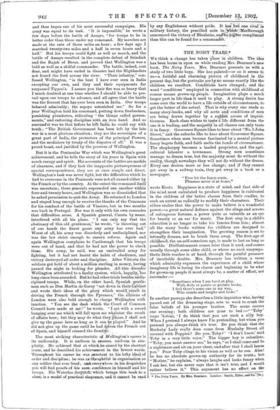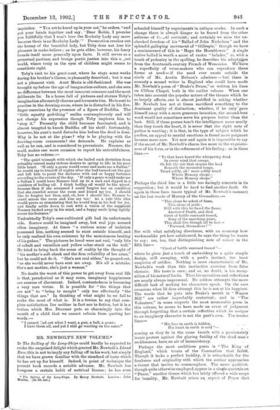THE NOISY YEARS.* WE think a change has taken 'place
in children. The idea
has been borne in upon us while reading Mrs. Dearmer's new book, The Noisy Years. Mrs. Dearmer presents us with a
study of two little boys. She has pahltecl—or so it seems to us—a faithful and. charming picture of childhood in ,th'e present day, but the portraits are by nO means exactly like the children we recollect. Conditions have changed; and the. word " conditions " employed in connection with childhood of course means grown-up people. Imagination plays a much larger part in life than it used to play. A strong desire has come over the world to have a life outside of circumstances, to get the better of the actual. That is why every one reads so many story-books, and why all sorts and! conditions of men are being drawn together by a sudtleii access of inquisi- tiveness. Each class wishes to taste g:life different from the one it is leading, and the majority in all classes can only taste it in fancy. Grosvenor Square likes to hear about "No.5 John. Street," and the suburbs like to hear about Grosvenor Square.
Sometimes when men' become fascinated by a mental picture fancy begets faith, and faith melts the bonds of circumstance.
The shopkeepl becomes a landed proprietor, and the agri- cultural labourer a townsman. Strong meli sometimes manage to, dream true, but the majority must fio without the reality, though nowadays they will not do without the dream. Every one desires more or less change; and if they cannot get away in a railway train, they get away in a book or a newspaper. "Ever let the faney.roam, Pleasure never is at home," wrote Keats. Happiness is A state of mind, and that side of the mind most calculated to produce happiness is cultivated in the children of the' better classes from their cradles, to such an extent as radically to modify their characters. Their elders realise that the power to make believe is a wonderful power,—a great natural defence against the slings and arrows
of outrageous 'fortune, a:power quite as valuable as an eye for beauty or an ear 'for music. The first step in a child's education is no longer to -take his fancies' from him ; almost all the many "Woks written for children are designed to strengthen their imagination. The growing reason is set to•
intensify dreams, not to brush them away. The first age of chihlliood, the un-self;conscious age, is made to last as long as possible:' Disillultionment comes later than it used, and comes
usually through some older child, or where no such unsympa- thetic little teacher is at hand, through the painful pressure -a inevitable doubts. Mrs. Dearmer has written a verse which admirably expresses the experience of a child whose imaginary life is losing its charm and beginning to be what
for grown-up people it must always be, a matter of effort, not surrender :— " Sometimes when I am hard at play,' With dolls or paints or picture books, I feel there's some one in my way, Who stands and laughs and looks."
In another passage she describes a little inquisitor who, having passed out of the dreaming stage, sets to work to crush the false beliefs of his younger brother. The scene occurs one evening ; both children are gone to bed :—" Toby' (says obin), I do think that you are such a silly boy.
When I pretend I always know I'm pretending, but when you pretend you always think it's true. Do you think that the Rockaby Lady really does- come from Hushaby Street all covered with Poppies? .Do you, Toby ? " I don't know,' -said Toby in a very little voice." The bigger boy is relentless. "Toby, you must answer me," he says, " or I shall come and be a nightmare and sit on your chest, and after that I shall lamnt you." Poor Toby clings to his vision as well as he can. Alas! he has no absolute grown-up authority for its truth ; but "Mother," he explains, "always laughs and looks funny when I ask her, but she never says that it isn't true, and I would rather believe it." This argument has no effect on the
• The Noisy Years, By Zr,. Dearmer. London: Smith, Elder, awito:4101.1 inquisitor. " Ycn are to kneel up in your cot," he orders, "and put your bands together and say 'Dear Robin, I promise you faithfully that I won't love the Rockaby Lady any more because there is no Rockaby Lady.' " Persecution crushes out the heresy of the beautiful lady, but Toby does not lose his pleasure in make-believe ; as he gets older, however, his fancy founds itself more generally upon facts. It still serves as a
perpetual pastime, and brings poetic justice into this u_ just world, where truly in the eyes of children might seems to constitute right.
Toby's visit to his great-aunt, where he stays some weeks during-his brother's illness, is pleasantly described ; but it was not a pleasant visit. Aunt Maria is old-fashioned, She was brought up before the age of imagination-culture, and she sees no difference between the most innocent romance and the most deliberate lie. In a house full of pictures and statues Toby's
imagination alteritateli*charms and torments him. He is sent to practise in the drawing-room, where he is disturbed in his five- finger exercises by the presence of a figure of Buddha. The "little squatty god-thing" smiles contemptuously and will not change his expression though Toby implores him to "atop it." Presently the child becomes fascinated, and is almost tempted to knock Buddha off his shelf ; fortunately, however, his aunt's maid disturbs him before the deed is done. Why is he not at the piano ? why is be playing with the drawing-room ornaments ? she demands. He explains as well as he can, and is considered to prevaricate. Neames, the maid, makes one more occasion to report his untruthfulness. Toby has no redress :—
" The quiet triumph with which she hailed each deviation from actuality caused many riotous desires to spring to life in his poor little heart. 'If only a genie would come and make me a Sultan!' he would say to himself of nights after she had turned out the gas and left him to paint the darkness with sad or happy fortunes according to the events of the day. 'If only a genie would make me a Sultan I could have Neames tied up in a sack and dipped in a cauldron of boiling oil. I think boiling oil would be the nicest, because then if she screamed I could forgive her on condition that she crawled across the room and kissed my toe. I should like to forgive her then, and, oh, how I should like Neames to crawl across the room and kiss my toe.' As a rule this idea would prove so stimulating that he would leap in his bed for joy, and finally settle down to rest with a vision of the suppliant Neames tucked away in his mind, and a happy smile lying lightly across his features."
Undoubtedly Toby's over-cultivated gift had its unfortunate side. Sorrow could be imagined away, but real joys seemed often imaginary. At times "a curious sense of isolation possessed him, nothing seemed to exist outside himself, and he only realised his own existence by the monotonous beating of his pulses." The pictures he loved were not real, " only bits of cobalt and vermilion and yellow ochre stuck on the wall." Retried to bring back the sense of reality by the thought of "his mother's soft cheek and the firm reliability of her arms," but he could not do it. "She's not real either," he gasped out, "or she would never have sent me away. It's all a mistake. She's not mother, she's just a woman."
No doubt the worst of this power to get away from real life is that, paradoxical as it may seem, imaginary happinesses are sources of discontent. Indeed, contentedness is becoming a very rare virtue. It is pessible for "the things that are not" to "bring to naught" only too effectually "the things that are." In thinking of what might be we fail to make the most of what is. It is a truism to say that com- plete satisfaction lies neither in fact nor in fiction, but it is a truism which Mrs. Dearmer puts so charmingly into the mouth of a child that we cannot refrain from quoting her words :—
"I cannot 2nd out what I want, a gun, a ball, a game; I have them all, and yet I still go wanting on the same."



















































 Previous page
Previous page